|
The Last Great Flying Adventure of the 20th Century
A small glimpse of the adventure written by Mike Blyth
I lay on my back and marvelled at the stars and the moon and the vastness of the heavens. The wings of our trikes loomed above
us, blocking out a part of the sky. I loved my trike, it was so pretty and so strong and it never failed me even in our wildest and most dangerous moments. What a way to experience life and see the world,
looking down on parts of our incredible planet that no one ever gets to see. Travelling by trike is probably the most unique means of transport. You can take off and land almost anywhere, you can fly where only
birds dare go, low enough to see expressions of delight and amazement on earthbound faces and sometimes high enough to see for hundreds of kilometre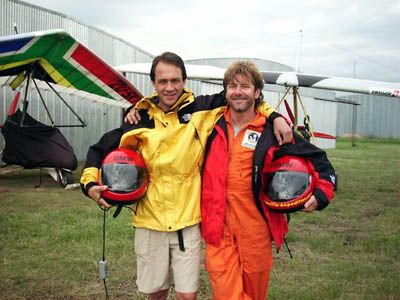 s across the most incredibly beautiful landscapes. s across the most incredibly beautiful landscapes.
I was exhausted but sleep seemed to elude me. I kept having flashbacks of the last 2 magnificent and crazy days.
I lifted myself onto one elbow and in the moonlight was able to make out Olivier's silhouette a few metres away. He was lying on his back holding his little radio above his head
with both hands and as a new Cuban Salsa track started, he turned the volume right up. This was my best dream come true.
The song faded and I stood up and looked around for signs of humans or animals. We had the little desert plateau that
we had landed on at sunset, all to ourselves. These were our best moments, alone in a wild and desolate part of the world. I sat down on the sand near to Olivier and we talked
passionately about our experiences over the last few days. We couldn't help having such strong feelings about our adventure – we were both having the most incredible time
of our lives. Every second of the last 7 months had been an adventure, but especially in Africa. I now knew that if you wanted real adventure, Africa would never disappoint you.
Two days before we had been in Nouakchott on the coast of Mauritania. Ahead of us lay the toughest flying of our
expedition – a flight through the world's largest and harshest desert, the Sahara. We were on our way to Timbuktu to the east, before turning south for the east coast of central Africa.
We sat on rickety chairs on the grimy little hotel patio in the dark and had a quick breakfast of strong coffee, stale bread and jam. It
was already hot. In the pre-dawn light we caught a very dilapidated taxi to the airport. The guards were there as promised, one sleeping at the hangar entrance and the other next to the trikes.
We packed our trikes quickly and taxied towards the runway as the sun rose. The Air Traffic Controller didn't know about the flight
plan we had filed the previous day, but let us take off anyway. The weather looked strange, ahead of us there was quite a lot of cloud about and in the distance, what looked like rain.
The town of Nouakchott was incredible to see from the air. Hundreds 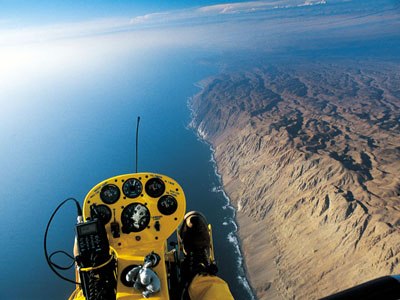 of brown flat roofed houses in brown streets. On the outskirts of
the town there were absolutely no trees or grass at all. Some of the little box-like houses were also built on the orange sand dunes of the Sahara. of brown flat roofed houses in brown streets. On the outskirts of
the town there were absolutely no trees or grass at all. Some of the little box-like houses were also built on the orange sand dunes of the Sahara.
We stayed low level, never going higher than 500 ft and followed the road eastwards towards Kiffa. We decided to
follow the road through the desert for safety. Our only real survival gear for this part of the world consisted of 5 litres of water each. The scenery was incredible, the orange dunes
that stretched out as far as the eye could see, camels and goats and Berber tents, the Berber men dressed in different shades of blue, the women in black, lime green, orange or
pink. Ahead of us the desert was covered in a fine green down-like grass. The recent rains had cleared all the dust out of the air and brought the desert to life.
After an hour we were flying under low clouds and ahead we could see rain. I climbed above the clouds to look where
the dangerous Cumulonimbus clouds were and saw only one far away to the north. Olivier was ahead of me by about 500 metres when he called over the radio to say that he
had flown into quite heavy rain and was going to land. He landed in the road next to a little hut and close by to a village of about 20 box-like mud houses.
As soon as we were down the villagers came running – the kids in the lead. They were very friendly, the young girls the noisiest.
Olivier chatted to a soldier and some of the men in French – I was spared from answering the same questions we get asked every
single day because of my non-existent grasp of the French language. We were given a glass of strong sweet green tea. It rained
heavily for an hour and as quickly as it had arrived, the rain stopped and although there was still a lot of cloud around, the way ahead looked clear.
We took off and kept going east, following the road. The weather was great; the visibility had improved to the extent that we were
able to see at least 100 km ahead. We stayed low level, flying at between 50 and 300 ft. near the only road, always within sight of each other. 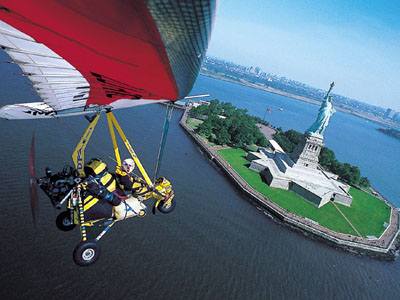
There are days when we have had exceptional flights and scenery and this was one of them. For hour after hour the
most unbelievable countryside unfolded before us. Olivier and I agreed that the flight was the best flight of the expedition …and for me, the best of my life. The scenery
just blew my mind. Can you picture an orange coloured desert turned green from recent rains, with no other roads or even tracks, no cars, no fences, no telephone or electric
wires – just a few tribal nomads near their tents with their camels and a few goats. In some places there were black rocky outcrops of incredible shapes that Mother Nature
somehow decided to turn into works of art. Through this amazing countryside the single tar road wound around the rocky outcrops and though the valleys as far as the eye could see, like a long thin black snake.
During the course of the day we landed five times in total. The second stop of the day was at a tiny fuel station on the
main road. We landed on the road and taxied up to the pumps and filled the tanks up. It was difficult coping with the refuelling and the money negotiations with so many
locals around us, all chatting, touching, pushing and pulling. The fuel station owner tried to make us pay an extra 20% for the fuel because he said we were rich and therefore
must pay more. Some of the young girls of marrying age were presented to us as possible wives. We feined shock and laughed and the crowd screamed with laughter and delight, chatting
louder than ever. Olivier bought some dates and long thin loaves of bread from the little store at the fuel station. We were in the air again within 20 minutes - a quick stop for us.
The third stop was at an abandoned airstrip close to the road in the middle of nowhere … far from anyone. Well, so we thought.
Within 10 minutes there were ten people with us, sitting in the shade of our wings and chatting loudly to each other. One old woman
sat in the sun and chatted to herself. Olivier lay down in the sun nearby for a while and I found a small bush to escape the chatter and the sun. We shared some bread and a litre of warm water.
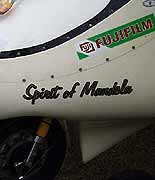 The fourth stop was again at a fuel station on the main road. This was our most entertaining stop of
the day. Again the locals arrived, but this time we were surrounded by only about forty people. There were three or four young girls of about 16 years of age who were the noisiest. One in particular kept
running to Olivier and I, pulling on our clothes and loudly chatting to us non-stop in her own Arabic language, looking at us straight in the eye. The other girls laughed and joked and touched our trikes
and our clothes and jumped back screaming with delight when we turned around or smiled or laughed. One of the girls stood in front of Olivier and with her left hand joined her thumb and forefinger creating
a circle and with the other hand moved her extended forefinger in and out of the hole indicating copulation. Olivier laughed, the girls screamed with laughter. The pump attendant had a tough time
keeping everyone calm – he shouted at the girls and the kids and they ran back a few metres laughing. It was a short but busy and entertaining stop – we took off from the road within 30 minutes. The fourth stop was again at a fuel station on the main road. This was our most entertaining stop of
the day. Again the locals arrived, but this time we were surrounded by only about forty people. There were three or four young girls of about 16 years of age who were the noisiest. One in particular kept
running to Olivier and I, pulling on our clothes and loudly chatting to us non-stop in her own Arabic language, looking at us straight in the eye. The other girls laughed and joked and touched our trikes
and our clothes and jumped back screaming with delight when we turned around or smiled or laughed. One of the girls stood in front of Olivier and with her left hand joined her thumb and forefinger creating
a circle and with the other hand moved her extended forefinger in and out of the hole indicating copulation. Olivier laughed, the girls screamed with laughter. The pump attendant had a tough time
keeping everyone calm – he shouted at the girls and the kids and they ran back a few metres laughing. It was a short but busy and entertaining stop – we took off from the road within 30 minutes.
The sun was quite low on the horizon when we decided that we had better find a quiet place to camp for
the night. We flew south, away from the road towards the most magnificent rock formations. After flying around the area for 15 minutes to make sure that there was no one nearby, we started looking for a
good spot to land. Finding a good and safe spot to land is often difficult when there is grass, because it is not possible to inspect the
potential runway properly when passing it at 75 km / h – even if going down to 5 ft above the grass. The ground was flat, but every
now and then there was a hole or a log lying in the grass. We flew around and around trying to make a decision on which spot would
be the safest. Eventually, I lined up and landed on an open area that looked free of all obstacles. The 300-mm high grass was
sparse, but even so, it was not possible to see the ground more than 5 metres ahead. Olivier landed on my tracks and we taxied to the nearest rocks.
We set up camp made ourselves comfortable. There were almost no mosquitoes, Later in the fading light we ate a few sandy dates,
an orange which I found under my seat, bread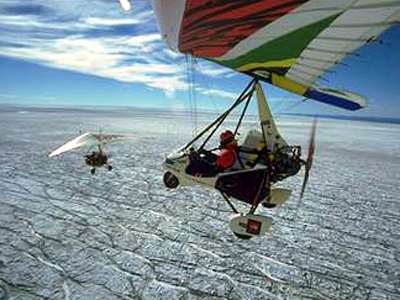 and drank some water. and drank some water.
We lay on our magic carpets which we had bought in Morocco and listened to music from Olivier's small radio.
Thunder rumbled in the distance and the sky lit up briefly from the lightning of a small storm to the south. Slowly the storm moved away and the night became deathly quiet.
Olivier had the coffee made and was already packing his trike when I woke up. It was still dark, but the sky was clear
and there was almost no wind. As it started to get light we discovered that a fine but dry mist surrounded us. Visibility was still about one kilometre, so we decided to take off –
and if the mist became too thick, we would land. We had flown in similar conditions before in Iceland and England and knew to stay within sight of each other because finding
each other again in bad visibility is scary – there is the real danger of a mid-air collision.
We flew towards the road and turned east. The visibility started to slowly get worse. Within an hour we were forced to
remain within 100 metres of each other to stay in sight. It was a strange kind of mist, nothing was wet, there were no clouds and as the day heated up the mist did not burn off.
Olivier and I chatted about the strange conditions over the radio.
After about two hours of being in the air, I calculated that I was burning more fuel than usual, so I turned around to inspect the
engine and to make sure the chokes were properly closed when I noticed that the air filters were completely brown and caked in dust.
I looked up at the wing and everywhere I looked on the trike, there was a fine layer of dust. So it was dust, not mist. I called Olivier
over the radio and informed him of my find. He was as astonished as I was …. actually, I wondered why it never occurred to me that it might be dust – considering we were in the Sahara.
We landed in the road at a tiny run-down fuel station – but they only had diesel so we turned around and immediately took off again
. Five kilometres further on we landed again – and again they only had diesel. The third landing was on the outskirts of a small town.
We taxied the last one kilometre down the road, between a few buildings to the fuel station. Taxiing in town can be dangerous,
because the local people have no concept of the danger that the propeller presents. We taxied fast to stay ahead of the fastest kids
and bicycles. At this stop, it became really crowded. The men of the village arrived and they kept the woman and kids back a little. Olivier disappeared for a few moments to buy water. 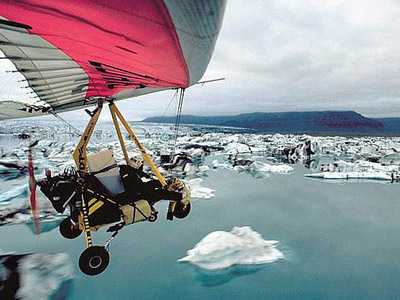
It was a fight to get everyone away from us to start the engines and taxi out of the fuel station. With much waving
of arms and screaming we were given some space and Olivier immediately rocketed into the air between the buildings. As I lined up on the road a car pulled onto the
road ahead of me and four men clambered out and stood in the road. I taxied as fast as I could towards the car and tried to go past them. One of the men tried to stop me,
indicating he wanted to talk, but I waved him out of the way and taxied around him. He made another attempt at trying to stop me, coming close to the prop. I gave full throttle to
get away from him, lined up on the road and took off. Some goats ran in front of me as I lifted off, but I passed harmlessly over the scattering animals.
The visibility became really bad. We were forced to fly at 200 ft above the road to keep it in sight and Olivier and I
stayed within 50 metres of each other. Olivier was flying slightly faster than I was, so every time I started to loose him in the dust I would call him over the radio and he would
do a steep 360-degree turn to the right and come up behind me.
After a further 30 minutes in the air we passed a pond near
the road and turned to land. We taxied down the embankment and parked next to the pond. For the last two days we had only been
able to obtain regular fuel which is not too good for the engines because when they are hot it creates pre-ignition, which makes the
engine run hotter than usual, but also they will not switch off after turning the ignition off. They keep running like something fighting
for survival, kicking around on the engine mounts. Sometimes the carbs fall off. The only way to stop the engine we discovered was to give full choke before switching the ignition off.
After rinsing the air filters in murky pond water and dishwashing liquid, we refitted them and taxied up the steep embankment onto
the road. The day was very hot and although I was flying in a T-shirt and jeansI still felt hot in the air.
The town of Nema was supposed to be our overnight stopping place, but neither of us wanted to be surrounded by hundreds of locals
, so we decided to head to the airport. The large and seldom used airport of Nema was 7 km out of town. We landed on it and taxied
towards the brown airport buildings. In the heat of the day it was becoming increasingly turbulent and unpleasant. Also, we needed a rest from the stress of flying in such bad visibility. 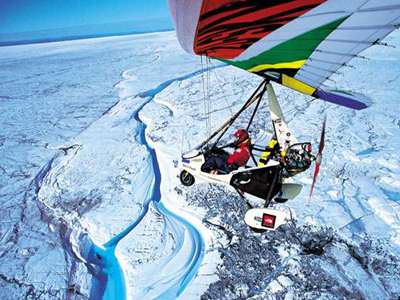
A local black man in a rickety old Land Rover offered us a lift to the fuel station in town for 100 French Francs. It was
too expensive so we decided that later we would fly over the town and try to land as near we could to the fuel station which we were told was in the middle of the town. The
airport had clearly been well set up with good equipment for an ATC and checking in desks, scales etc, but now the windows were broken and everything was covered in a layer
of dust. In the fire truck garage a thin old man was lying down on a rusty trolly, with his daughter sitting near him fanning him with a piece of cardboard. Olivier asked what
was wrong with him and the answer was a severe headache, so he gave him a powerful pain tablet and within a short while the man was sitting up having tea which Olivier had
also made from the brown muddy water which they fetched from a well nearby.
I found a quiet side of the building and put my mattress down, took my shoes off and lay down in the shade. The
heat, flies and flurries of dust and sand from the wind kept me from sleeping.
After a while Olivier joined me and we chatted about the flying.
At 4 pm we took off in incredible heat. I estimated the outside air temperature to be about 45 degrees C. Amazingly enough the air
was completely calm, with almost no turbulence.
The fuel station was surrounded by brown mud houses everywhere. The main road had power lines running down both sides, so we
circled the area trying to decide on a good spot to land. I landed on an open piece of ground between the houses about one
kilometre from the fuel station. A soon as I was down the kids started running towards me. In my quest for a safe place to land I
didn't make a mental note of where to taxi to get to the fuel station, but Olivier said he knew. We taxied as fast as we could to try
and keep ahead of the running kids. We taxied over humps and skidded down embankments, powered around houses and bounced
through ditches. The ground was rough, some of the rocks in the way, huge. We raced as fast as we could, moving around the big
obstacles and bouncing over the smaller rocks and rubbish. The kids raced between the mud houses to our right taking a shortcut
through a huge ditch that we had to turn back from. We arrived on the main tarred road and crossed it to the fuel station and
switched off the engines. Kids and adults alike arrived in droves, screaming with delight at these strange flying motorbikes, which
had dropped out of the sky. We tried to keep the crowds back but had little success. Over at his trike I could see Olivier was also
trying to deal with the situation. It became hot from the bodies pressed so closely together and dusty from them moving their feet
around in the sand. They all wanted to touch the trikes. From their prospective it's no wonder they think the white man is crazy! 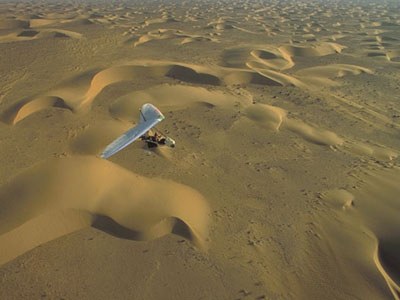
At every stop we have done at a fuel station on the main road we have been questioned by the police and always the
exchange has been pleasant and quick. After a quick look at our passports and the flight authorisation number for Mauritania, we have been allowed to continue, the police
sometimes stopped the traffic to allow us to take off. On this occasion we were questioned closely by two serious policemen and the police chief was consulted. The situation
did not look good. We realised that they were aware of the fact that aircraft are not allowed to land on public roads. Not being able to speak French, I couldn't help, so it was up to
Olivier's ingenuity and negotiating skills to ensure we stayed free men. Olivier told them that we would be staying the night at the nearby airport and that we had just popped
into town to fill up. After thirty minutes of negotiations, he retrieved our passports and with full tanks, four litres of water and two Cokes, we prepared to taxi back to the so-called runway.
Again I followed Olivier. I discovered that whenever I turned the trike suddenly towards the kids, they would run away, so
I used this technique to keep them a safe distance from my potentially deadly propeller. Olivier taxied over a small rise and out of sight. He called me on the radio and asked
where the spot was where we had landed. I wasn't sure where he was and just then he said that he had found a spot big enough to take off. At the first spot that looked suitable I gave full
power to take off. It was slightly uphill and the day was hot and my trike was heavy – so after bouncing heavily through a few small
ditches I eventually lifted off and was just able to clear the roof of a small mud hut. There were two chickens on the roof, which
immediately also took off for a kind of diving flight and hard crash landing on the ground. I smiled to myself, partly from the relief
of getting airborne before becoming a decoration on the side of someone's hut and partly at the comical picture the two chickens made. Olivier also remarked over the radio that he had taken ages to lift off.
We flew straight out over the desert towards the Mali border. The visibility had improved and we could see for about one km. After
flying for about thirty minutes, we selected a flat spot on top of a small plateau and landed. I had seen a tiny village in the distance, but hoped that they hadn't seen us land.
Well, it wasn't to be. Within fifteen minutes we heard the sound of distant chatter and saw about twenty adults and children running
in our direction.
Olivier decided that he would stop them some distance away and marched very businesslike to meet them. I watched the
proceedings with interest from the trikes. Within one minute Olivier had said his piece, turned on his heel and marched back. There
was a stunned silence. After about thirty minutes of quiet yakking they dispatched their top man to us to re-negotiate the deal. He
was a pleasant man of about forty, who had been in the military in Nouakchott, was the owner of the only car (a Land Rover) in the
village and could speak French fluently. Olivier chatted to him in French. Neither of us minded having one or two visitors, but the
noisy crowds were starting to drive us crazy. Olivier told them that they could visit us in the morning, knowing that we hoped to get into the air at sunrise.
|